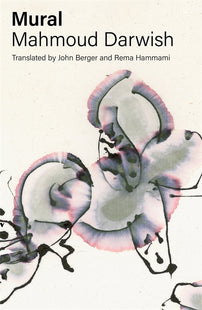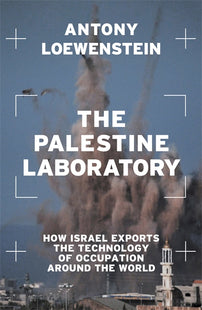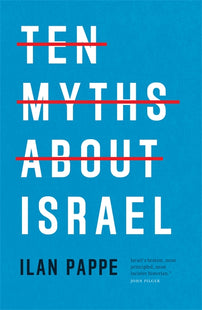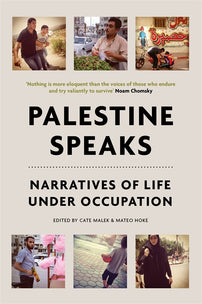Death in the Air
The Gazan writer Asmaa al-Ghoul, with around 20 others scattered across the globe, is on a hunger strike with just one goal and one demand—to stop the war. Here, Ben Ehrenreich writes on al-Ghoul's life and work, and her campaign to end the Israeli assault on Gaza.

More than two weeks into Israel’s assault on the people of Gaza, on a day when Israeli airstrikes killed 700 Palestinians, 344 of them children, the writer Asmaa al-Ghoul began a hunger strike. About 20 others scattered across the globe, she said, were also taking part. They launched it, they wrote, “as an investment in our fragility as a force for peaceful resistance.” The strike had just one goal and one demand—to stop the war.
“I know, it's a very radical choice,” al-Ghoul told me when I met her 12 days later, “but it's also a very ugly war.” For the last six years she has lived in Toulouse with her two children, far from her birthplace in the embattled strip of coastal Palestine of which she once wrote, “I am her daughter. I look like her.” The decision to hunger strike, she admitted, came out of helplessness. “It’s the only thing I can do when I am here and my family is there.”
Or not quite the only thing. She is also writing constantly and publishing everywhere she can, mainly in Arabic but also in French, more than ten articles, she said, since the war began. That has helped to keep her mind busy and to channel the desperation, as it had in the previous wars she had covered, in 2008-9, 2012, and worst of all, in 2014. Her memoir of those years of war—and of her many clashes with Hamas in between, during what counted as peace—was published in English in 2018 as A Rebel in Gaza, co-authored by Selim Nassib. But for those earlier wars, she had been there, racing up and down the Strip, doing interviews, filing stories, not sitting in exile far away. This sense of uselessness was something new. And unbearable.
“I thought maybe this is will help, but what will it help?” she asked. Friends in Gaza, she admitted, were making fun of her. “They said, ‘We respect you but you will just lose your health and it will do nothing.’”
Whatever her doubts, she is committed to continuing. Her health, so far, seemed unimpaired. (The hunger strikers have not given up liquids, only solid food.) But she had thought, she said, that the war would be over quickly.
I asked her what she thought now.
“I think I will lose a lot of weight,” she said, and laughed.
***
We had met that morning, at al-Ghoul’s suggestion, at a demonstration against the war in the center of town. The march began outside a metro stop named for the French socialist and anti-militarist Jean Jaurès, who was murdered by a nationalist assassin three days after the outbreak of the First World War. It was raining hard and the adjoining plaza was crowded with police. Earlier in October, the French interior minister had issued a blanket ban on demonstrations showing solidarity with Palestine. In Toulouse, police had attacked a previous demo at Jean Jaurès with tear gas. Still, a few hundred people came out to march.
[book-strip index="1"]
Despite nearly two weeks without food, Al-Ghoul was filled with nervous energy, embracing friends and hustling up and down the boulevard, searching the crowd for her sister, who, along with her mother, she had managed to get out of Gaza and into France a year and a half ago. But that sister had a twin who was still in Gaza, as was al-Ghoul’s father. “I was awake until five,” al-Ghoul told me, scrolling all night, updating the news on her phone. The days were bad, the nights worse. She subscribed to three channels on Telegram that reported the locations of Israeli strikes as they happened, and listed the names of the dead.
Her sister in Gaza had given birth seven months earlier. She had lived in the north of the Strip, in the Jabalia refugee camp with her husband, her infant daughter, and her in-laws, until the rest of the family finally convinced her to flee south. Jabalia has since been largely leveled. Her sister had spent one night taking shelter in a school. “It was terrible,” al-Ghoul said, packed and filthy, and everyone was coughing. Now ten of them—all women and children except for one old man—were jammed into a small apartment, “but they are lucky.” She showed me a picture on her phone of her niece—Yoyo, they called her—that her sister had just sent her. She was taking a bath in a green, plastic basin, smiling and reaching for the camera.
Al-Ghoul’s father was farther south, in Rafah, in the house her grandparents had built. They came as refugees in 1948 from the village of Sarafand al-Amar, near Ramla. It had been the site of a notorious massacre by British troops in 1918. Thirty years later it would be entirely emptied of its Palestinian population and then swallowed by an IDF base and prison that have since been subsumed by the Israeli town of Tzrifin. Al-Ghoul’s grandparents, who were teenagers at the time, walked the 70 or so miles to Rafah. These histories feel more alive than ever, the past echoing through the present like an artillery concussion. Rafah is safer now than the north of Gaza, but only by degrees. The Israeli military has continued to bomb southern areas of the Strip even as it has encouraged Palestinians to flee southward.
When the march reached its goal we found a metro station and took the train to al-Ghoul’s neighborhood, near the end of the line. She checked her phone continuously, toggling between Telegram and Facebook, looking for the news that she did not want to find. Walking to her apartment, she pointed to an olive tree. Her mother, now doubly a refugee, had harvested the olives from all the branches she could reach, brushing aside al-Ghoul’s protests that this wasn’t done in France.
I would meet her a few minutes later: a small woman with a warm smile tightly bound by worry. She sat straight-backed in a chair against the wall, staring at the television in front of us, al-Jazeera broadcasting video of the latest devastation—grey puffs of smoke rising over an endless maze of rubble. Eventually she stood up and walked to the kitchen to finish preparing lunch. She apparently had her own opinions about her daughter’s hunger strike, and had expressed them by cooking feast after feast, driving al-Ghoul into her bedroom to hide from the smell—mujadarra, one day, manaqeesh another, and today maqlouba, chicken cooked with rice and flipped upside down onto a plate, the closest thing Palestine has to a national dish.
The war had been hard on her mother, al-Ghoul told me. It brought back all the other wars, dating back to 1967. After the 2008-9 war—“Cast Lead,” the Israelis called their “operation”— her mother’s “heart collapsed,” al-Ghoul said. Literally. It took two stents to open it up again. In the 2014 war, al-Ghoul’s uncle’s house in Rafah had been bombed. He was killed along with eight other members of his family, three of them children, none of them militants of Hamas or of any other group. The youngest to die was a newborn named Mustafa. He had lived 24 days. “Tears flowed until my body ran dry,” al-Ghoul wrote in a column published two days later. She found photos of her dead cousins online, the children’s bodies stored in an ice-cream freezer because the nearest hospital had been shelled by Israeli tanks.
***
When Hamas breached the walls surrounding Gaza on October 7, al-Ghoul said, “I was happy.” Not because Israeli civilians had been killed—that news, which filled her with sadness, shame, and fear, had not yet reached her—but because, she said, “we thought this will move something,” that finally, something might shift and the slow, steady strangulation under which Gaza had lived since 2007 might be broken.
“We didn’t know the rest of the story,” she said. In those early hours, before word got out the killings in the kibbutzim and the Israeli towns outside the Strip and at the music festival, this is what people were celebrating. We thought the targets were military, al-Ghoul said, and for a moment she allowed herself some giddy hope that some real victory might come of it, that Israel could be forced to end its siege so “we can come and go like normal people,” free to drive across their own country. “This is what I miss,” she said, “I miss the good air, just to visit, to have a home.”
She couldn’t finish the thought. Sobs overwhelmed her. Her voice crumbled into a moan. She waved her hand at the images flashing across the television screen, more bodies covered in gray dust. “Look what happened,” she said, “they destroyed it. They destroyed Gaza.” The first neighborhood to be razed, she said, was al-Rimal, in Gaza City. Her family had lived there in a rented house for most of the last 19 years. “It was one of the most beautiful places in Gaza.” She brought up a photo on her phone, a vast, nonsensical geometry of twisted concrete and buildings collapsed in on themselves. It was captioned in French: “Ma maison était ici,” My house was here.
It’s hard to remember now, but the 2014 war felt apocalyptic, as if no greater calamity could occur. Two thousand three hundred Palestinians killed in six and a half interminable summer weeks, a number surpassed in just eight days of the current war. When it was over, al-Ghoul remembered, people began to prophesize another war, one that would destroy everything that remained. Thousands left Gaza. Almost everyone who could get out did. Al-Ghoul was one of them. What Israel experienced as peace, as an acceptable, even desirable calm, Gaza did not. It was like in Los Angeles, al-Ghoul said, where people live in deferred expectation of a truly cataclysmic earthquake, the Big One that will wipe the city clean. “But our earthquake is Israel,” she said, and those years of mourning and rebuilding were also years of dread.
[book-strip index="2"]
“You know the play,” she said, “Waiting for Godot. It’s like this, waiting for someone, for something that never happens.”
“But now it happened,” I said.
“Yeah,” she said. “And look who has come to us now.”
***
Two days before her uncle’s family was erased in 2014, al-Ghoul visited a hospital in Rafah. She wrote about this at the time, recounted it again in her book, and told the story again to me. Among the bodies she saw was the corpse of a one-year-old boy dressed in a pair of pink pants. He looked, she said, like he was alive, like he was resting, like he had exhausted himself playing and was about to get up for more. In another room a young woman, inconsolable, asked al-Ghoul if she had seen her son.
“What’s he wearing?” al-Ghoul asked.
He was wearing pink, the woman said.
“I thought I should answer her not as a journalist but as a mother because as a mother I would want to know.” She told the woman that her son was dead. The woman clutched her own breasts. “And these?” she cried. “Who are they going to suckle now?” Then she grabbed al-Ghoul by the throat and tried to strangle her until onlookers pulled her off.
A lot of war reporters have a story like this, one that doesn’t let go of them. But al-Ghoul was never just a journalist. “I’d like to meet her again,” she said, “to apologize.” She still remembers the boy’s name. Rizq Abu Taha. But now, she said, “There are thousands of women like her.”
Death on television isn’t death. It’s an image, a recyclable flash of pixelated light accompanied by commentary, chatter, noise, the obscenity of cliché. It can be bent into some semblance of meaning, inserted into one or another political narrative. But when you’re there, al-Ghoul said, what stands out is the silence. “It’s very quiet.” Bodies that minutes earlier were warm and alive are cold and still. And then there’s the smell, which no screen can convey. “I smell the death in the air even though I am not there,” al-Ghoul said. “When I go out, when I walk, there’s death in my eyes. I cannot live like before. My eyes are full of death.”
Ben Ehrenreich is the author of two books of nonfiction, Desert Notebooks and The Way to the Spring; two novels, Ether and The Suitors; and many articles, stories, and essays.



